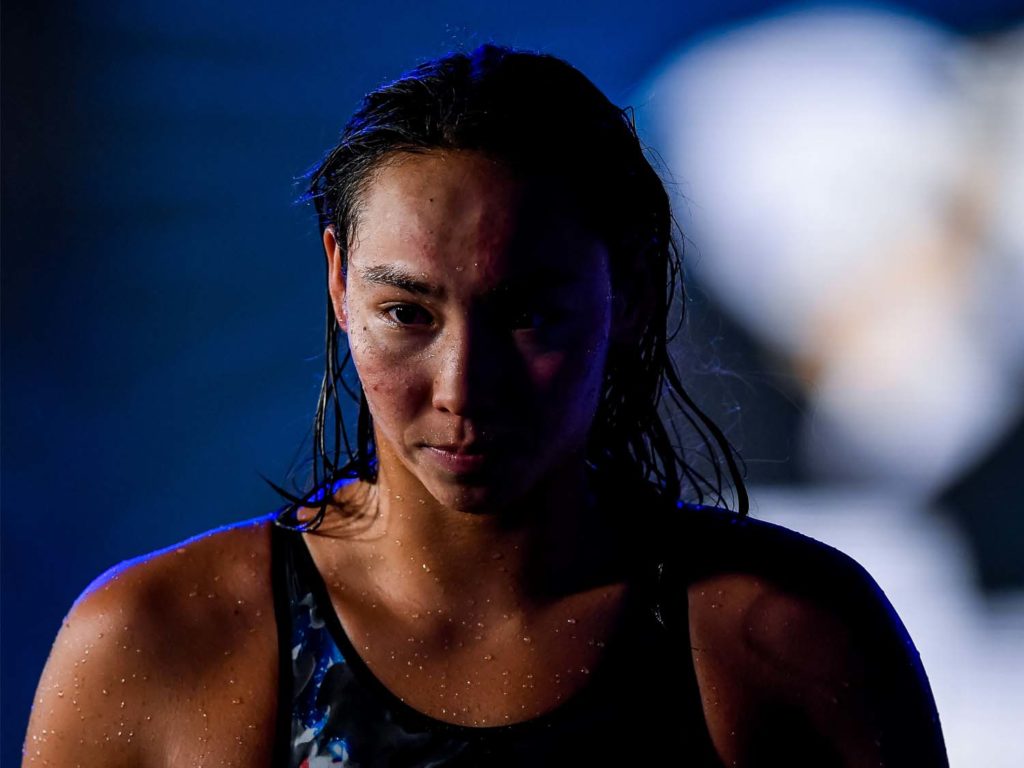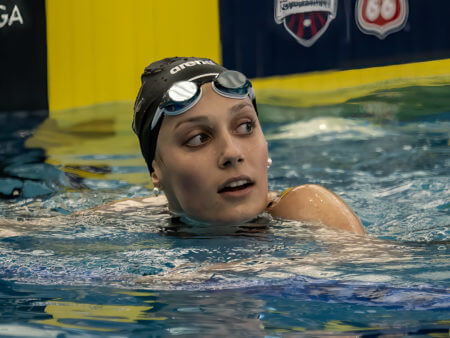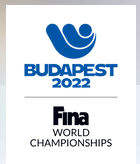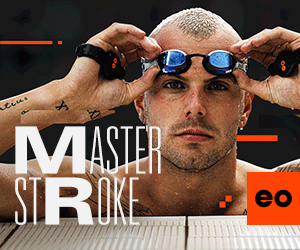Young American Swimmers Fulfilling Huge Potential in Early Going at World Championships

Editorial content for the 2022 FINA World Championships coverage is sponsored by eo SwimBETTER.
See full event coverage.
Swim faster... faster, with game-changing data insight into your technique. eolab.com #eoSwimBETTER

Young American Swimmers Fulfilling Huge Potential in Early Going at World Championships
As young swimmers tease their capabilities throughout their teenage years, it becomes obvious what could be, but that shard of doubt remains. Maybe they won’t succeed on the big stage and become the dominant figure we believe possible. After all, it was no certainty that Caeleb Dressel would become the swimmer he is today, well-established as the best male swimmer in the world since winning seven gold medals at the 2017 World Championships. Sure, he had shown tantalizing promise as a sprinter for years, but until it happens, it’s impossible to know.
At the culmination of the Tokyo Olympics, it was easy to look at the United States roster and imagine what could be possible. Eleven teenagers had represented the United States in Tokyo, and five of those swimmers won individual medals, with three others earning relay honors and the final three qualifying for one individual final each. Just think, the logic went, how these swimmers could build off their Olympic experience in preparation for the next Games in Paris, especially with an Olympic cycle of just three years instead of four because of the COVID-19 pandemic. By 2024, these swimmers would be in the middle of their primes.
Of course, swimming is not as simple as a linear progression of improvement, and it would be foolish to expect this narrative to fit completely. But at these World Championships in Budapest, we have seen three occasions in only seven individual finals where a young American has delivered on all that talent for the most excellent results of their respective careers (thus far, at least).
Sunday evening, that meant to rookies from the Tokyo team rising to the challenge of earning individual gold medal No. 1. At the start of the finals session, Torri Huske ran away with the world title in the 100 butterfly, and a little over an hour later, Alex Walsh was dominant in the final of the women’s 200 IM. Walsh as entered the meet as a front-runner following exceptional performances at the NCAA Championships and then the U.S. International Team Trials, while Huske was certainly a medal favorite following her three-win performance at Trials, but she had been a popular pick for silver behind China’s Zhang Yufei.

Alex Walsh — Photo Courtesy: Peter H. Bick
In the moments, both swimmers handled themselves like champions, like they knew what they were doing, like they had been there before. Both were the top qualifiers after prelims and semifinals, and both took command of their finals swims right away to the point where no one could catch up. Of course, both swimmers were less than a year removed from impressive yet painfully-close finishes on the Olympic level. Walsh had watched as Yui Ohashi surged ahead on the final 50 of the 200 IM final (Walsh ended up with silver), and Huske had missed a medal podium in the 100 fly by just one hundredth, her time less than two tenths behind gold medalist Maggie Mac Neil.
Winning world titles? That was the anticipated next step, and both crossed the threshold.
Admittedly, Huske won against a weakened field with Mac Neil and Olympic bronze medalist Emma McKeon missing, but her final time was less than two tenths off the world record. We will see plenty of cases this week where a world champion clearly benefits from absences, but so impressive was Huske’s performance that it’s hard to lump her in that category. Walsh, on the other hand, beat the best IMers in the world by almost a second-and-a-half, with almost no one missing from that mix.
The other instance of a young and frequently-mentioned U.S. swimmer making the leap came on day one, in the men’s 400 IM. You just maybe missed it as Leon Marchand annihilated the field in the men’s 400 IM final and swam the second-fastest time in history. The silver medalist in that event was 20-year-old American Carson Foster, who as recently as three months ago was labeled as a swimmer who could not swim his best in major finals. There was a history for that: Foster had faded down the stretch in the 400 IM final at Olympic Trials only to post a time quicker than the Olympic-gold-medal-winning time one month later. His next focus meet was the NCAA Championships, and while Foster was pursuing his first individual NCAA crown, he swam slower times in finals than prelims in all of his events.
That’s not what happened Saturday, when Foster had the lead at the halfway point but could not hold off Marchand’s unbelievable 1:07.28 breaststroke split. Actually, Foster swam a time of 4:06.56, his lifetime best by 1.9 seconds and good enough to make him the eighth-fastest man in history. The mark would have been good enough to comfortably win gold at the 2021 Olympics and 2019 World Championships, and no one had swum that fast in almost two years.
Sure, he ended up with a silver medal after Marchand’s exploits, and you tip your cap. But no more questions about Foster in big races.
Finally, no analysis of the American performance in Budapest would be complete without mentioning Leah Hayes, a few years younger than the college-aged Huske, Walsh and Foster but already standing on the World Championships podium. Hayes has dropped two seconds from her 200 IM lifetime best in less than two months, and she is already among the top-25 swimmers in history.
As a whole, the United States team has gotten off to a flying start in Budapest with five gold medals and 12 total medals (three times the number as any other country), but we must pump the breaks somewhat on reading too much into that number. Think about the swimmers missing, and already, we have seen what can happen without Ariarne Titmus (women’s 400 freestyle) or Adam Peaty (men’s 100 breaststroke in the mix). The medal tally means less at these World Championships than at most other international meets, and that’s a theme we will continue noting in analysis throughout the week and beyond.
Entering day three, there are some American concerns regarding veterans. Katie Ledecky is the strong favorite in the women’s 1500 free, while Regan Smith is in pole position for a women’s 100 back final missing world-record-holder and Olympic champion Kaylee McKeown, but world-record holders Ryan Murphy (men’s 100 back) and Lilly King (women’s 100 breast) are each seeded well down the list in their respective finals.
Oh, but there’s also a strong chance for another young American to take a big career step when Katie Grimes, 16, races for medals in the final of the women’s 1500 free after she finished one spot away from a medal in her Olympic debut last year. The best thing that can happen for the United States this week is the legion of college-aged and younger swimmers continuing their scintillating start.





